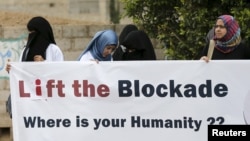The U.N. Children’s Fund warned that tens of thousands of children in Yemen could die if import restrictions on fuel are not lifted, as the severe shortage is hampering the delivery of essential aid and keeping health clinics from operating.
UNICEF spokesman, Christof Boulierac said Yemen’s fuel supply could run out in less than a week. “If restrictions on the commercial imports of food and fuel continue, then it will kill more children than bullets and bombs in the coming months,” he said.
Boulierac said 120,000 children will suffer severe acute malnutrition over the next three months if health and hygiene services that rely on a steady fuel supply do not function normally.
He said 2.5 million children under the age of 5 are at immediate risk of diarrheal and other communicable diseases as sanitation systems collapse and municipalities cannot pump water to homes because of a lack of fuel.
He said vaccination campaigns have stopped in many health centers across the country, putting children at risk of pneumonia, measles and other preventable, communicable diseases.
'Difficult situation'
“In this difficult situation, UNICEF is delivering vital health, nutrition, water, sanitation and protection services across the country. However, our humanitarian access to many areas is extremely difficult and we are frequently being blocked by parties to the conflict from going to places where people need us most,” Boulierac said.
Yemen imported 90 percent of its food requirements and much of its fuel before the conflict began. As the war was heating up, the U.N. Security Council passed a resolution mandating all commercial imports into Yemen be inspected to make sure no arms were being delivered.
Jens Laerke, spokesman for the Office of the Coordination for Humanitarian Affairs, said this is the main obstacle to the import of adequate amounts of fuel and other aid.
“This means it has a crippling effect on the humanitarian operation. Even though we do have pre-positioned stocks in the country, we simply are unable to get it out for the people in need because we cannot transport it,” Laerke stated.
Fighting between Saudi Arabia and the Houthi rebels is escalating in advance of a five-day U.S.-Saudi brokered humanitarian pause, which is supposed to begin Tuesday, May 12.
The war is taking a heavy toll. The World Health Organization reported 1,439 people have been killed and nearly 6,000 wounded between March 19 and May 4. Many of the victims are civilians.











